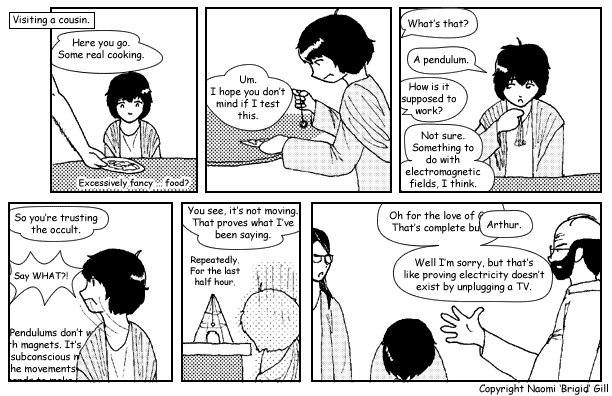
There are times when it seems that to be fine dining the dish should bear no resemblance whatsoever to the food it started out as. Not to say that I haven't had fancy food that tasted good, and looked like it did. I have. Even then, however, an individual with a sensitive stomach has to be careful. It's impractical to do a thorough lab analysis on everything that might possibly end up on your plate. That's where things like this pendulum come in. It's just a normal metal washer on a string, so I guess I can see where people would be dubious. Still, to call it occult? And to prove it doesn't work by removing it from the source of the electromagnetic fields (or whatever) that it would be interacting with? The explanation that it works by the subconscious manipulating the involuntary twitchings of the hand holding the pendulum seems rather silly, as well. Especially since the thing has indicated that foods I *like* are bad for me to eat. (I happen to like raw tomatoes. I can't eat them as they give me heart burn.)
*headdesk*
Simply a reminder that just because you don't understand something that doesn't mean it's supernatural.
*headdesk*
Simply a reminder that just because you don't understand something that doesn't mean it's supernatural.






9 comments:
"Simply a reminder that just because you don't understand something that doesn't mean it's supernatural."
Wasn't it Isaac Asimov or Arthur C. Clark or someone like that who said that "Any sufficiently advanced science will seem like magic" to a sufficiently primitive society? Or something like that?
@Dan: I think it was Mr. Clark, but I could be wrong.
It was Clarke. Incidentally, the standard way to test this is to see if the pendulum holder can reliably detect something (say, tomatoes) when they can't see the plate.
Yes, Brigid, it was Arthur C. Clarke. This was the third of his Three Laws of Scientific Prediction:
1.When a distinguished but elderly scientist states that something is possible, he is almost certainly right. When he states that something is impossible, he is probably wrong.
2.The only way of discovering the limits of the possible is to venture a little way past them into the impossible.
3.Any sufficiently advanced technology is indistinguishable from magic.
BTW, I love your Dad's simile. Reminds me of one of my favorites quotes: "Talking about music is like dancing about architecture." This quote has been attributed to many from Elvis Costello to Steve Martin, but from the research I've read the likely creator of the phrase was Martin Mull in the early eighties.
Anyway, I'm gonna start checking my food for magnetic fields and see if my health improves!
;-)
Any sufficiently advanced magic will appear like technology to the technologically-minded. =^-^=
Hey, they've still not been able to explain Dark Matter and Dark Energy. Isn't that just magic that has a whitewash of scientific theory spread over it? There's no explanation, there's no knowledge of what its form truly is... it just exists.
Mind you, I believe in magic. But I believe more mundane things are magical, like a sunrise, a bumblebee in flight, or the sleepy yawn of a baby that puts everyone else to sleep around him/her.
As for your pendulum? Your belief influences how it works. Thus it works the way you want. For someone who doesn't believe? It won't. ^^
Rob H.
@Nathaniel: That would make a lot of sense. The test, that is, though the attribution of the sort-of quote does, too.
I've done that, by the way. Rather, I've tested foods with unknown ingredients. Including foods that I'd very much like to be good for me but turned out not to be. That seems to disprove the subconscious theory, at least.
@Tenacious-K: Gotta love those laws. ^_^ And glad you like that simile. He seems to come up with his best stuff when angry, or at least frustrated.
@Robert: And that's why magiteck has become so popular in fiction. I do think the pendulum works on principles that can be measured. It's much like how Western science was convinced that the joints in the skull were fixed and couldn't move, no matter what Eastern medicine said. Then we got equipment that could measure tiny movements and found that, whattayaknow, those joints *do* move.
Though that is not to say that supernatural phenomena does not exist. It does, and should be treated with caution.
Good comics, by the way.
The way I'm inclined to describe that 'it's occult' reaction is: "anything I don't like or understand is Satanic."
I ran into quite a bit of that, growing up: mostly on 'Christian' radio. Which, indirectly, led to my conversion to Catholicism: Where I don't have to put my brain on 'hold.'
@Dad: Thanks! ^_^
Hehe. Catholics also allow alcohol (in moderation) and bingo. We're awesome that way.
Post a Comment